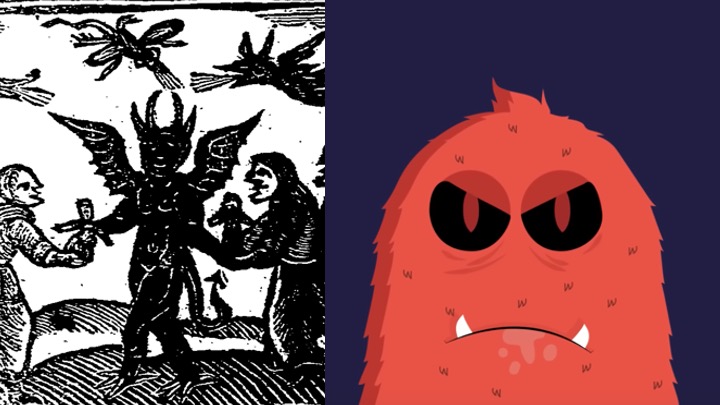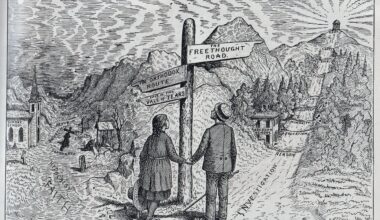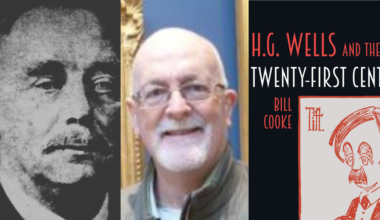
Since their earliest origins, Christian cultures have been preoccupied with the temptations of the Devil, and humanity’s susceptibility to them. ‘Every man is tempted, when he is drawn away of his own lust, and enticed. Then when lust hath conceived, it bringeth forth sin: and sin, when it is finished, bringeth forth death.’ (James 1: 14-15)
The popularity of Satan, the arch-tempter, may be on the wane, but Police Scotland, in preparing to implement the Scottish Hate Crime Act, have found a contemporary devil to replace him: the Hate Monster. ‘When yer feeling insecure, when ye feel angry; he’ll be there, feeding aff they emotions. Getting bigger and bigger, till he’s weighing ye doon [sic].’
Beware, anyone who has ever felt any heated disagreement with someone or something, especially where a ‘protected characteristic’ is involved: you may be possessed by the Hate Monster and anything you say or do, especially on social media, may be used by righteous informers and priests – sorry, police – as evidence of your sinful mind.
As far as the protected characteristic of religion is concerned, the unbeliever may be glad that, under section 9(b) of the Act, expressions of ‘antipathy, dislike, ridicule or insult’ are not, on their own, automatically deemed to constitute ‘threatening or abusive’ behaviour, which is the first element in the section 4(2) offence of ‘stirring up hatred’. (The second element of the offence is the intent to ‘stir up hatred against a group of persons’ on the basis of their protected characteristic.)
Yet to advocates of open debate, this carve-out for free expression about religion offers tepid comfort. Not only is it apparently confined to certain categories of expression, but it does not apply to any of the other protected characteristics, including, most controversially, ‘transgender identity’.
As a criterion of judging whether apparently threatening or abusive behaviour is ‘reasonable’ and therefore defensible, section 4(5) invokes the right to freedom of expression under Article 10 of the European Convention on Human Rights, including of ‘ideas that offend, shock or disturb’. However, under section 9, while ‘discussion or criticism’ of protected characteristics is not automatically deemed threatening or abusive, antipathy, ridicule and the like presumably would be in the case of any characteristic except religion.
Altogether, the wording of the Act raises several questions about how it will function in practice, and how sections 4 and 9 will relate to each other.
If someone is gauche enough, for instance, to criticise the claim that a man can change into a woman, how is he or she to know whether doing so will be deemed mere discussion or an act that a ‘reasonable’ person would consider threatening or abusive – and if the latter, whether it will itself still be judged ‘reasonable’ on the basis of the ECHR right to freedom of expression, or will be held an unreasonable, impermissible act of stirring up hatred against trans people? Who should decide what is ‘reasonable’ in such fraught debates? You might as well ask a lay court to adjudicate on the relative merits of con- and transubstantiation.
Moreover, if it is a question of intent, how is the court to determine, as a second and distinct test, what the defendant intended the effect of their words to be, other than by the words themselves?
The overall thrust of the ‘stirring-up’ offences is to imply that the expression of disagreement about characteristics specially defined and sanctioned by the Scottish state is always potentially criminal. This is a short step from criminalising thought itself. And that is what the Hate Monster is all about.
The idea that thought can be sinful goes right back to the Old Testament: ‘But I say unto you, That whosoever looketh on a woman to lust after her hath committed adultery with her already in his heart.’ (Leviticus 18: 28)
From next week in Scotland, therefore, who knows how mild an expression of doubtful or dissenting views, in particular ‘gender critical’ ones, may be sufficient to saddle a person with a criminal record – or whether most dissenters will be too afraid to speak at all, because they do not want to risk it. No wonder the Act has been so heavily criticised by women’s rights campaigners, as well as free speech advocates more generally.
Of course, if you are inclined to express antipathy to women, no need to worry – biological sex, unlike transgender identity, is not on the protected list.
Section 12 does contain a power for the Ministers to add ‘the characteristic of sex’ to the list. So in theory, if supporters of women’s rights ever won a majority at Holyrood, they could implement this section, and then sit back and watch the police and the courts tearing their hair out as trans women denounced women for misgendering, and women denounced trans women for misogyny.
In the long term, though, slapping more restrictions on speech about ever more categories of protected groups will benefit no one, except perhaps those who happen to be in power for the time being. If we want a society which is not a dictatorship, if we believe in intellectual and moral progress rather than stagnation, then we have to be prepared for give and take: to be offended, insulted, made uncomfortable and even upset by the views of people who disagree with us, even on the most sensitive subjects of all.
As Jonathan Rauch put it, ‘To appeal to a country’s conscience, you need an antagonist.’ If you demonise your antagonists, if you label anyone who disagrees with you an agent of Satan or the Hate Monster, then you as a country are depriving yourselves of the opportunity for moral doubt and conflict, which is the essence of a conscience.
Plato once defined thinking as the soul’s dialogue with itself. Take away a country’s opportunity for dialogue and disagreement, and you might as well kill its soul.








1 comment
‘Every man is tempted, when he is drawn away of his own lust, and enticed. Then when lust hath conceived, it bringeth forth sin: and sin, when it is finished, bringeth forth death.’ (James 1: 14-15)
So, just keep on sinning and live forever?
Your email address will not be published. Comments are subject to our Community Guidelines. Required fields are marked *
Donate